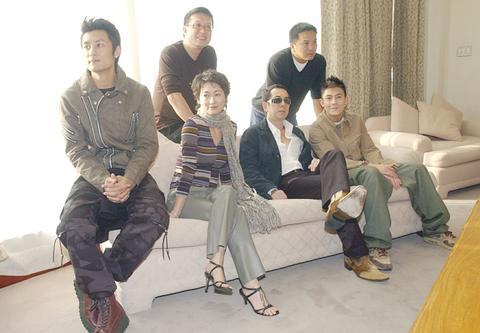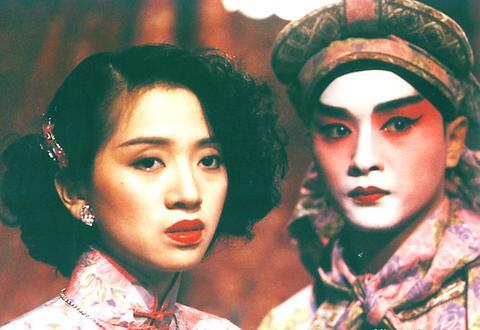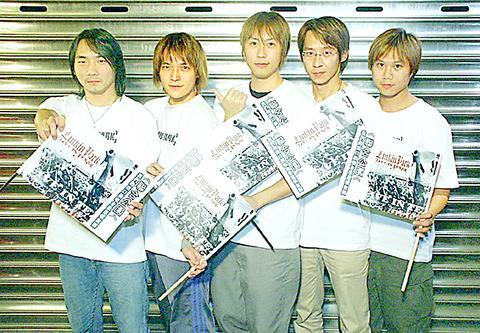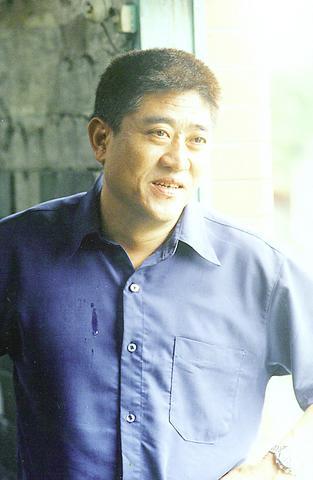In movies, TV and music, last year was characterized by only a few innovations and too many tragedies. There were some bright moments, for sure, but even these only seemed great against the gloomy background of sad news and pop-culture industries in general decline.
Below, Pop Stop revisits the good, the bad and the ugly stories that kept Chinese pop culture chugging along last year.
1) Taiwan Thunderbolt Fire (

PHOTO: TAIPEI TIMES
2) Hong Kong's movie industry kept its stride with the star-studded trilogy Infernal Affairs(
3) On April 1, one of Hong Kong's brightest stars, Leslie Cheung (
4) Another sad event came when Taiwan's own Evel Knievel and adored actor and singer Ke Shou-liang (

PHOTO: TAIPEI TIMES
5) Mayday (
6) Taiwan saw the underground release of its first hard-core porno, called Taiwan Plumber (
7) The black metal band Chthonic (

PHOTO: TAIPEI TIMES
8) Tsai Ming-liang's (蔡明亮) protegee, Lee Kang-sheng (李康生) came perilously close this fall to parodying his and his mentor's filmmaking style in an advertisement he made for Family Mart (全家便利商店) that featured the cast of Goodbye, Dragon Inn (不散) and The Missing (不見) moping about in the convenience store contemplating their beverage purchases in tiresome longshots.
9) If imitation is the best form of flattery, then Next Magazine (壹週刊) can take some pride in its invented term -- "doing the splits" -- (劈腿), used to describe someone who is two-timing their significant other. It become common usage in all the major Chinese-language papers after exposing Hsu Shao-yang (許紹洋) as the on-the-side lover of Lin Wei-jun (林韋君), who was the girlfriend of pop singer Lin You-wei (林佑威). Subsequently, affairs in all the major media have been referred to as a "splits event"
(

PHOTOS: TAIPEI TIMES
10) And finally, another of Hong Kong's pop legends, Anita Mui (

That US assistance was a model for Taiwan’s spectacular development success was early recognized by policymakers and analysts. In a report to the US Congress for the fiscal year 1962, former President John F. Kennedy noted Taiwan’s “rapid economic growth,” was “producing a substantial net gain in living.” Kennedy had a stake in Taiwan’s achievements and the US’ official development assistance (ODA) in general: In September 1961, his entreaty to make the 1960s a “decade of development,” and an accompanying proposal for dedicated legislation to this end, had been formalized by congressional passage of the Foreign Assistance Act. Two

Despite the intense sunshine, we were hardly breaking a sweat as we cruised along the flat, dedicated bike lane, well protected from the heat by a canopy of trees. The electric assist on the bikes likely made a difference, too. Far removed from the bustle and noise of the Taichung traffic, we admired the serene rural scenery, making our way over rivers, alongside rice paddies and through pear orchards. Our route for the day covered two bike paths that connect in Fengyuan District (豐原) and are best done together. The Hou-Feng Bike Path (后豐鐵馬道) runs southward from Houli District (后里) while the

March 31 to April 6 On May 13, 1950, National Taiwan University Hospital otolaryngologist Su You-peng (蘇友鵬) was summoned to the director’s office. He thought someone had complained about him practicing the violin at night, but when he entered the room, he knew something was terribly wrong. He saw several burly men who appeared to be government secret agents, and three other resident doctors: internist Hsu Chiang (許強), dermatologist Hu Pao-chen (胡寶珍) and ophthalmologist Hu Hsin-lin (胡鑫麟). They were handcuffed, herded onto two jeeps and taken to the Secrecy Bureau (保密局) for questioning. Su was still in his doctor’s robes at

Mirror mirror on the wall, what’s the fairest Disney live-action remake of them all? Wait, mirror. Hold on a second. Maybe choosing from the likes of Alice in Wonderland (2010), Mulan (2020) and The Lion King (2019) isn’t such a good idea. Mirror, on second thought, what’s on Netflix? Even the most devoted fans would have to acknowledge that these have not been the most illustrious illustrations of Disney magic. At their best (Pete’s Dragon? Cinderella?) they breathe life into old classics that could use a little updating. At their worst, well, blue Will Smith. Given the rapacious rate of remakes in modern